When I first ventured into the online world with frugal4ever.com, I was bursting with ideas. Eager to share my knowledge on passive income, I dove headfirst into content creation. But to my dismay, my masterpieces remained largely undiscovered. The digital cobwebs were starting to form. That's when I stumbled upon the magic potion of the online world: keyword research.
It might seem like a fancy term, but in its essence, keyword research is the compass guiding your content to the right audience. Think of it this way: every day, there are 3.5 billion searches made on Google alone. That’s over 40,000 searches every second! With such staggering numbers, how can one ensure their content doesn't just become a drop in this vast digital ocean?
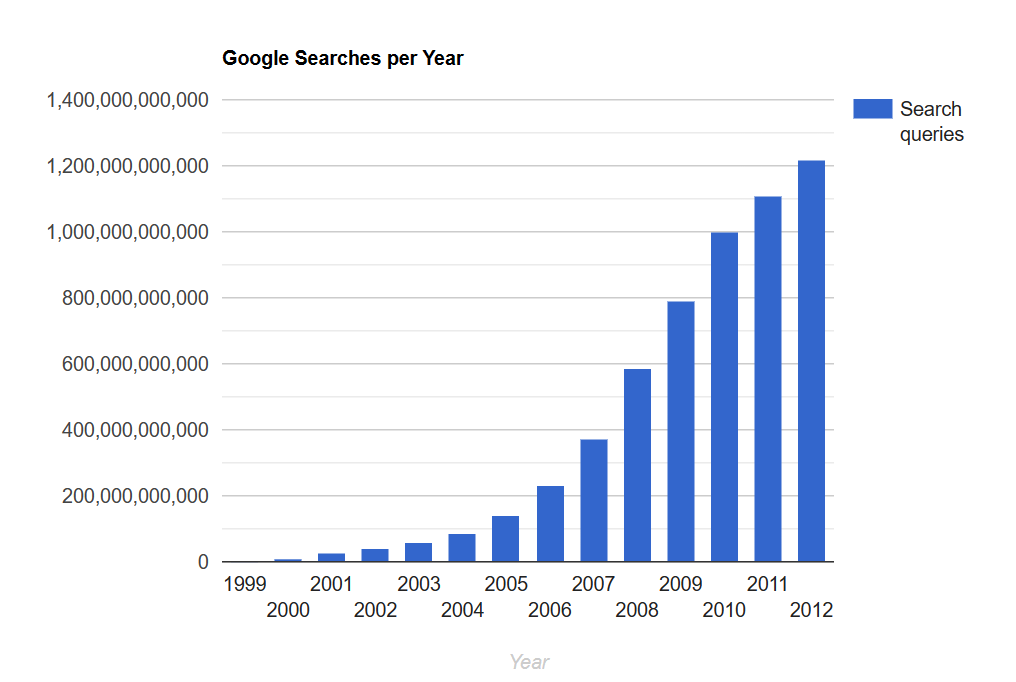
For anyone starting in the online realm, especially if you're focusing on generating passive income, the importance of keyword research can't be overstated. It's the secret sauce, the decoder ring, that aligns your content with the needs and curiosities of your potential readers.
Imagine having a stall in a vast marketplace. How would customers find you amid thousands of other vendors without the right signboard? Keywords serve as that signboard, directing potential readers, customers, or clients right to your doorstep.
However, like any skill, mastering keyword research requires time, patience, and a dash of trial and error. But fret not! Every bit of effort you invest now will be a giant leap toward achieving your passive income dreams.
The Real Importance of Keywords in blogging
Have you ever wondered how some content seems to “pop up” when you search for a topic? That's the magic of keywords at play. It's akin to entering a vast library, and instead of being overwhelmed by countless bookshelves, a guide immediately hands you the exact book you were looking for.
Now, consider that 93% of online experiences begin with a search engine. That's right, nearly all of our journeys on the internet begin by typing a query into that familiar search box. These queries, or ‘keywords', act as the gatekeepers of the digital realm, determining which content gets seen and which remains in the shadows.
Understanding the power of keywords is pivotal for a blogger, especially someone like me who's passionate about topics like passive income. It's not just about getting more eyeballs on your content; it's about ensuring that those eyeballs belong to the right audience. It's about connecting, engaging, and resonating with individuals who are genuinely interested in what you have to say.
And here's the kicker: 50% of search queries are four words or longer. This shows that users are getting more specific and more intentional with their searches. They're not just looking for ‘bread' but ‘whole grain gluten-free bread recipes.' This shift towards specificity presents a golden opportunity. By understanding and utilizing the right keywords, you can ensure that your content reaches the users who are genuinely hungry for it.
To put it succinctly, keywords are not just words. They're bridges. Bridges that connect your insights, experiences, and knowledge with an audience that values and seeks them.
Breaking Down the Basics: What is Keyword Research?
If I were to revisit my early days of blogging, I'd find myself overwhelmed with enthusiasm but lacking direction. I'd often ask, “Why isn't my content on passive income getting the traction I hoped for?” That's when I discovered keyword research, a game-changer in my blogging journey.
So, what exactly is keyword research? In its essence, it's the art and science of understanding what your target audience is searching for on the internet. It’s not just about finding popular words or phrases; it's about delving deep into your potential readers' needs, curiosities, and problems.
Imagine being able to eavesdrop on a vast group of people and learn what they're curious about, what problems they're trying to solve, and what they're passionate about. That's what keyword research grants you: a sneak peek into the internet's collective consciousness.
But here's something even more intriguing: Over 20% of search queries on Google are unique and have never been searched before. This means that new questions and curiosities are brewing daily in internet users' minds. As a blogger, especially one focused on dynamic topics like passive income, this offers a continuous opportunity to provide fresh insights and answers.
Keyword research is more than a technical task; it's an ongoing conversation with your audience. It's about asking, “What do you need?” and then crafting content that answers, “Here's what I have for you.” When you position your content this way, you’re sharing information and building connections, trust, and a community.
Tools to Get You Started
As with most things in life, having the right tools can make a world of difference. The realm of keyword research is no different. But with a plethora of tools available, which ones are truly worth your time? Let's break it down.
Free vs. Paid tools: Which is right for you?
When I first started navigating the waters of keyword research for frugal4ever.com, budget was a concern. I wondered, “Can I really get quality insights without breaking the bank?” The short answer is yes but with some caveats.
Free Tools: They're a fantastic starting point. They provide basic insights and can give you a solid foundation in understanding what your audience seeks. However, they might not offer in-depth data, trend forecasts, or detailed competition metrics.
Paid Tools: They're an investment. These tools generally provide more comprehensive data, including keyword competitiveness, search volume trends, and even content suggestions. If you're looking to dive deep and refine your strategy to perfection, investing in a paid tool might be the way to go.
Google Keyword Planner: A beginner-friendly tool
My initial steps into keyword research began with Google's very own Keyword Planner. Not only is it free, but it's also incredibly user-friendly. Integrated with Google Ads, it offers insights directly from the world's leading search engine. From search volumes to related keyword suggestions, it provides a solid base for those just dipping their toes into keyword research.
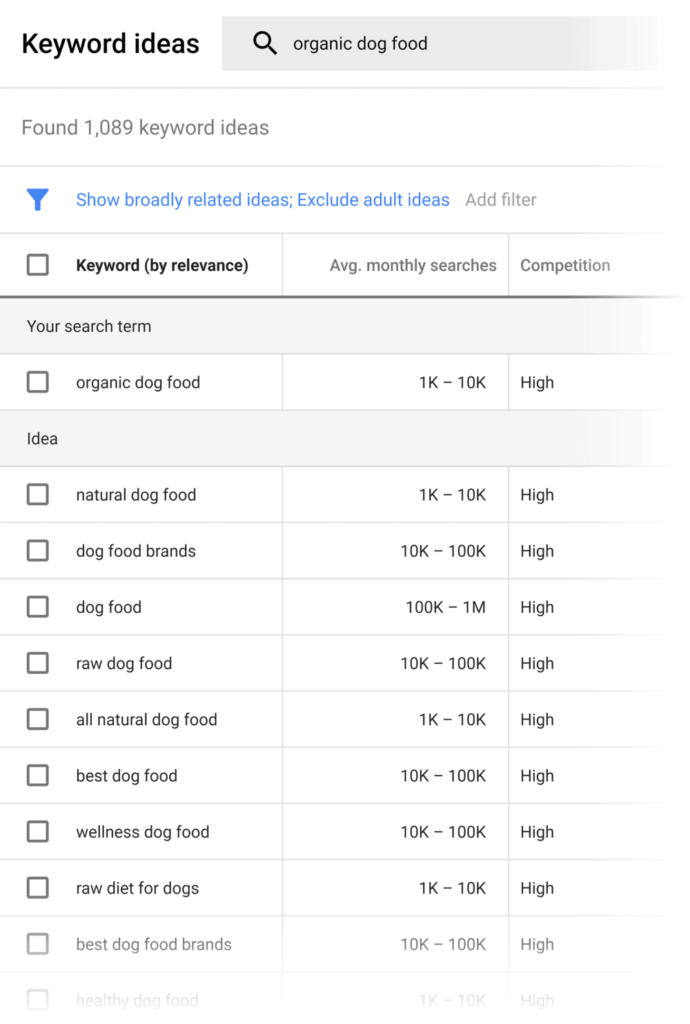
Ubersuggest: Offers keyword insights and competition levels
Another gem in the world of free tools is Ubersuggest. Created by digital marketing expert Neil Patel, it offers a tad more depth than Google's Keyword Planner. Beyond just keyword suggestions, Ubersuggest provides insights into competition levels, backlink data, and even content ideas. For someone on a budget but hungry for data, Ubersuggest strikes a perfect balance.
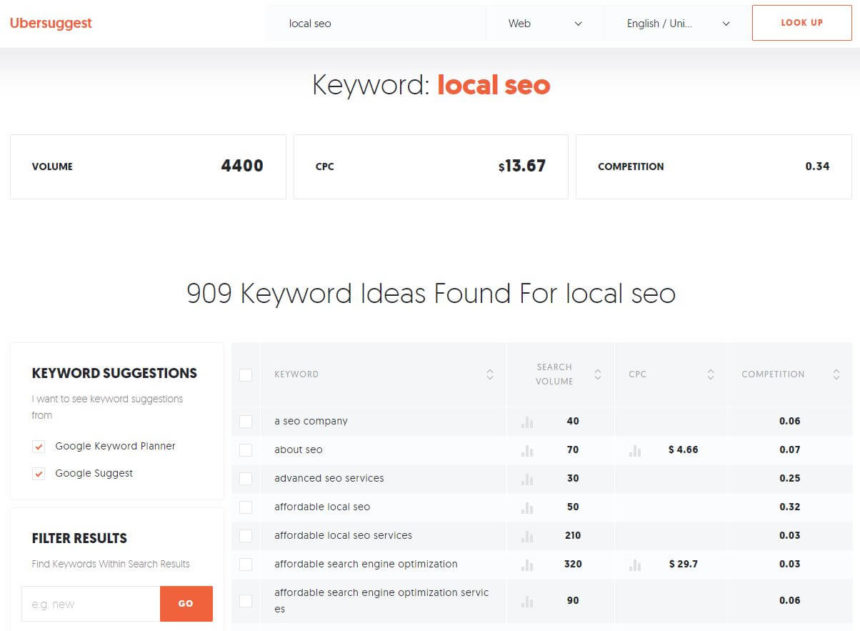
The best tool often depends on your needs and resources. While starting out, free tools like Google Keyword Planner and Ubersuggest can offer valuable insights. As your passion and commitment to keyword research grow, you might consider diving deeper with a paid tool to refine your strategy to perfection.
More Free Tools to Explore:
Answer The Public: Have you ever wondered what questions your audience is asking? Answer The Public is a fantastic visualization tool that presents keyword questions in a ‘search cloud' format. It's like reading the minds of potential readers.
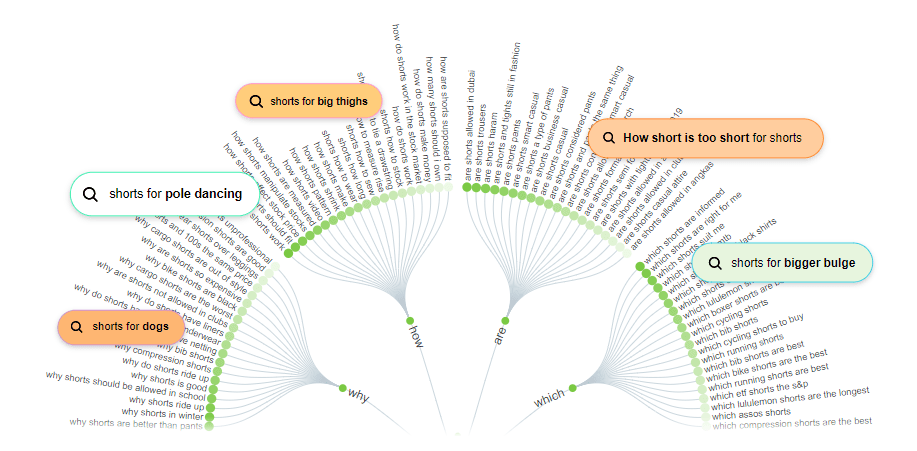
Keyword Surfer: A Chrome extension that displays search volume, keyword suggestions, and estimated traffic right in your Google search results. It's a quick and handy tool for on-the-fly research.
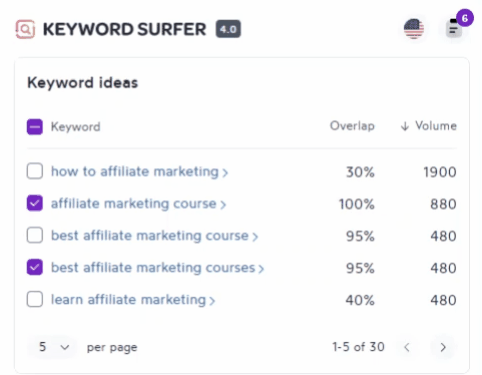
Popular Paid Tools Worth the Investment:
Ahrefs' Keywords Explorer: A premium tool that offers a wealth of information. From keyword difficulty scores to search volume trends, Ahrefs provides comprehensive data that can truly refine your content strategy.
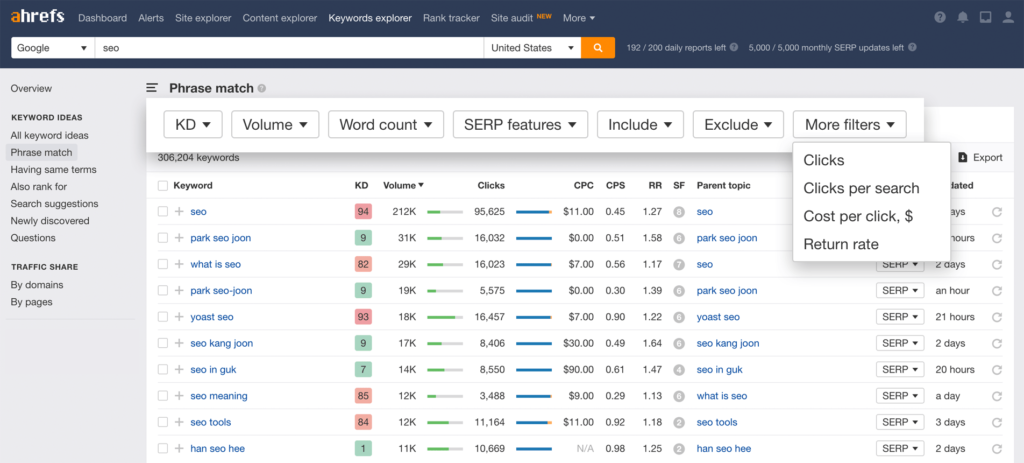
SEMrush: Another heavyweight in the SEO world, SEMrush offers keyword data and insights into your competitors. Understand where they rank and what keywords they're targeting, and tailor your strategy accordingly.
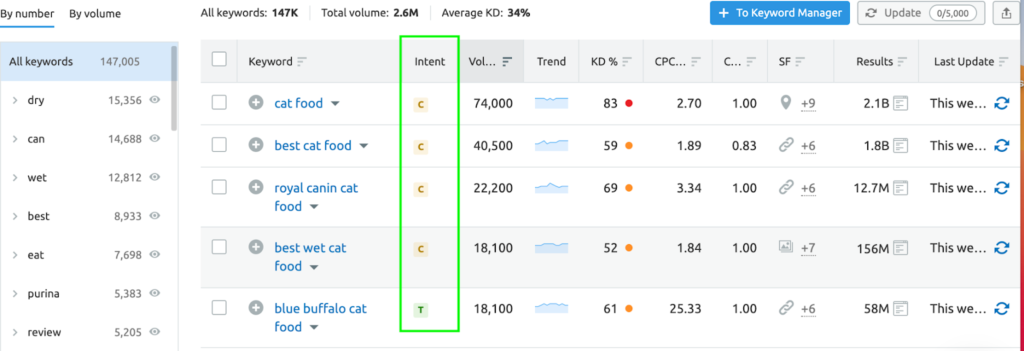
KWfinder: Known for its user-friendly interface, KWfinder makes keyword research both intuitive and insightful. Dive into keyword difficulty, search volumes, and even localized results for specific regions or cities.
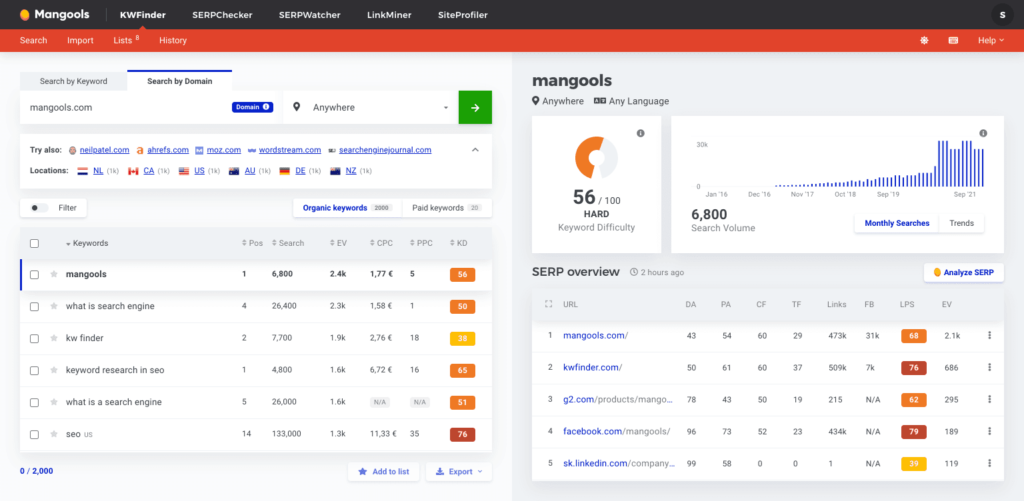
In the vast sea of keyword research tools, both free and paid versions offer unique advantages. Free tools can provide a strong foundation for beginners or those on a tight budget. But as your blog grows and you seek deeper insights, the detailed data from paid tools can be invaluable. Remember, it's all about understanding your needs and making informed decisions that align with your goals.
How to Choose Relevant Keywords
Once you've explored various tools and have a list of potential keywords in front of you, the next big question is: “Which ones should I focus on?” Selecting the right keywords can feel like a balancing act, but the process becomes more intuitive with a few guidelines in mind.
Relevance to Your Content: Picking Keywords that Match What You’re Writing About
Imagine you're a chef specializing in Italian cuisine, but all your ingredients are for making sushi. Confusing, right? The same logic applies to keywords. If they don’t align with your content, you confuse search engines and, more critically, risk disappointing your readers.
For instance, when I write about passive income on frugal4ever, I ensure my keywords resonate with the core theme. A mismatch can lead to increased bounce rates, where visitors leave the page almost immediately after landing on it. The relevance of your content to your keywords is the cornerstone of user satisfaction and search engine optimization.
Statistic: The Percentage of Online Content that Never Gets Seen Due to Poor Keyword Relevance
A staggering 91% of content online gets zero traffic from Google, primarily because the content's keywords don't align well with what users are searching for. (source). This means that nearly 9 out of 10 pages on the internet remain invisible to their potential audience. Ensuring keyword relevance could be the key to avoiding this invisibility.
Factoring in Search Volume and Competition: Balancing Popularity with Attainability
When looking at potential keywords, two critical factors to consider are search volume (how often a keyword is searched) and competition (how many sites are trying to rank for that keyword).
High search volume sounds tempting, but ranking for that keyword can be an uphill battle if the competition is fierce. Conversely, targeting a keyword with low competition but negligible search volume might get you on the first page of search results, but with few people searching for it, the victory can be hollow.
The sweet spot? Finding keywords that have a decent search volume but moderate competition. These ‘low hanging fruits' can offer the best return on your effort, driving steady traffic without demanding excessive time and resources.
Selecting the right keywords is akin to choosing the right ingredients for a recipe. It requires a keen understanding of your content, awareness of what your audience is seeking, and strategic considerations of volume and competition. Master this, and you're well on your way to crafting content that resonates and ranks.
Long-Tail Keywords: Your Secret Weapon
In the vast world of keyword research, a special kind of magic often goes unnoticed by beginners: the power of long-tail keywords. As mysterious as they sound, these keywords can be the ace up your sleeve when trying to rank and resonate with your target audience.
What are Long-Tail Keywords and Why are they a Goldmine for Beginners?
Long-tail keywords are typically longer and more specific keyword phrases that visitors are more likely to use when they're closer to the point of purchase or when they're using voice search. Their length makes them less common than shorter keyword phrases, but their specificity makes them shine.
For beginners, diving into the vast ocean of broad keywords can be intimidating, not to mention highly competitive. This is where long-tail keywords come to the rescue. Since they are more specific, they tend to have a lower search volume, which often translates to less competition. But here's the catch: they also usually boast higher conversion rates. Why? Because users searching with long-tail keywords often know precisely what they're looking for.
On my journey, I realized the sheer potential of these keywords. Instead of competing with giants on broader terms, I found my niche with more detailed queries, connecting more authentically with my audience.
Example: The Power of Precision
Let's say you're aiming to rank for the keyword “passive income.” This broad term will have substantial competition, from established blogs to financial institutions. However, by refining it to a more specific phrase like “ways to earn passive income for beginners,” you narrow down the competition and address a particular segment of your audience: beginners looking for passive income opportunities. This specificity can lead to better engagement and more meaningful traffic.
Read more about the Benefits of Using Long-Tail Keywords here.
There's a myriad of advantages when it comes to using long-tail keywords:
- Lower Competition: These keywords tend to be less competitive, giving you a fighting chance to rank higher.
- Higher Conversion Rates: Being more specific means attracting readers who are genuinely interested in your content, leading to better engagement and higher chances of conversion.
- Better for Voice Search: With the rise of voice-activated assistants like Alexa and Siri, users often phrase their searches as questions or longer statements, aligning perfectly with long-tail keywords.
The essence of long-tail keywords is understanding and addressing your target audience's unique needs and queries. By focusing on them, you can carve out a niche for yourself in the crowded online space, offering tailored solutions and content that genuinely resonates.
The Role of Intent: Understand Your Audience's Needs
Have you ever stopped to think about why someone is searching for a particular keyword? Behind every search query lies an intent, a specific need or question the user hopes to address. By understanding and aligning with this intent, you can craft relevant, deeply engaging, and satisfying content for your readers.
Breaking Down the Types of Search Intent
Typically, search intent can be categorized into four main types. Let's dive deeper into each:
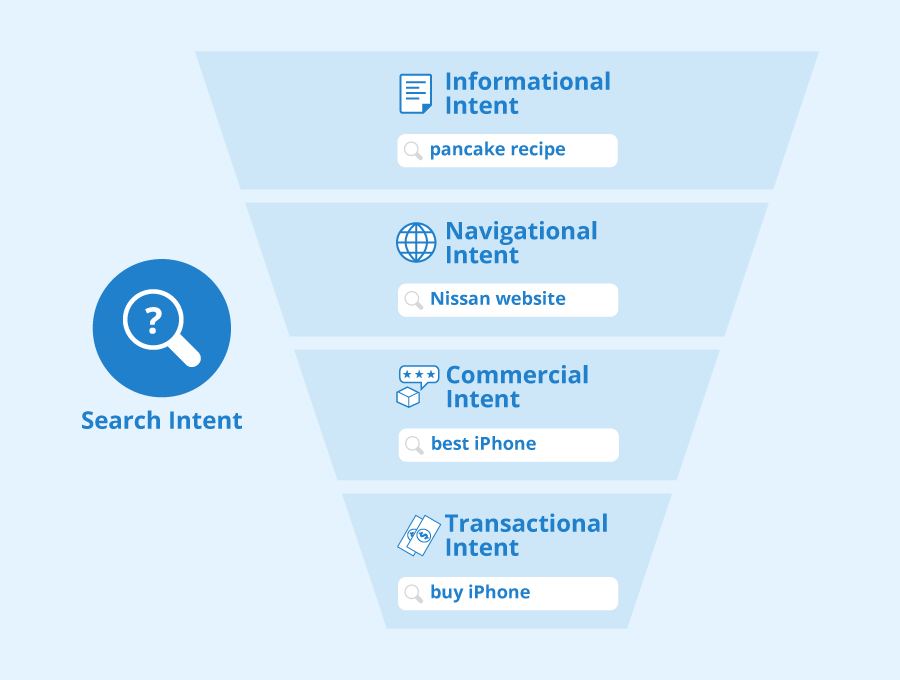
1. Informational Intent
This is when a user is seeking knowledge or an answer to a question. These searches usually start with “how to,” “what is,” “why,” or “tips for.” Users with informational intent are in the learning phase and aren’t necessarily looking to make a purchase or decision immediately.
2. Navigational Intent
Users with navigational intent already have a specific site or brand in mind, and they use search engines as a tool to get there. Examples include searching for “Facebook login” or “frugal4ever blog.” These users aren't looking to explore options but rather to reach a known destination directly.
3. Transactional Intent
The user's goal is clear: to buy or perform a specific action online. Searches like “buy iPhone 13” or “subscribe to Netflix” fall into this category. Content targeting transactional intent should provide a smooth path toward conversion, whether it's making a purchase, signing up for a newsletter, or any other call-to-action.
4. Commercial Investigation
These users are in research mode, potentially looking to make a purchase in the future. They're comparing options, reading reviews, and seeking the best solutions. Searches like “best DSLR cameras 2023” or “top passive income strategies” fall under commercial investigation. Detailed comparison articles, reviews, or listicles can be highly beneficial for such users.
Understanding the intent behind search queries allows you to tailor your content strategy more effectively. It’s not just about attracting traffic but about bringing in the right kind of traffic – visitors who find value in what you offer and engage deeply with your content.
Integrating Keywords Naturally: Do's and Don'ts
In the quest to rank high in search engine results, it can be tempting to sprinkle keywords throughout your content generously. But there's a fine line between effective keyword usage and keyword stuffing. Striking the right balance is crucial for search engines and delivering quality content to your readers.
The Danger of Keyword Stuffing
Keyword stuffing is the practice of loading a webpage with keywords in an attempt to manipulate a site's ranking in search engine results. While it may seem like a good strategy to some, it can backfire spectacularly. Not only does it make content unreadable and unengaging for humans, but search engines like Google have algorithms in place to detect and penalize such practices.
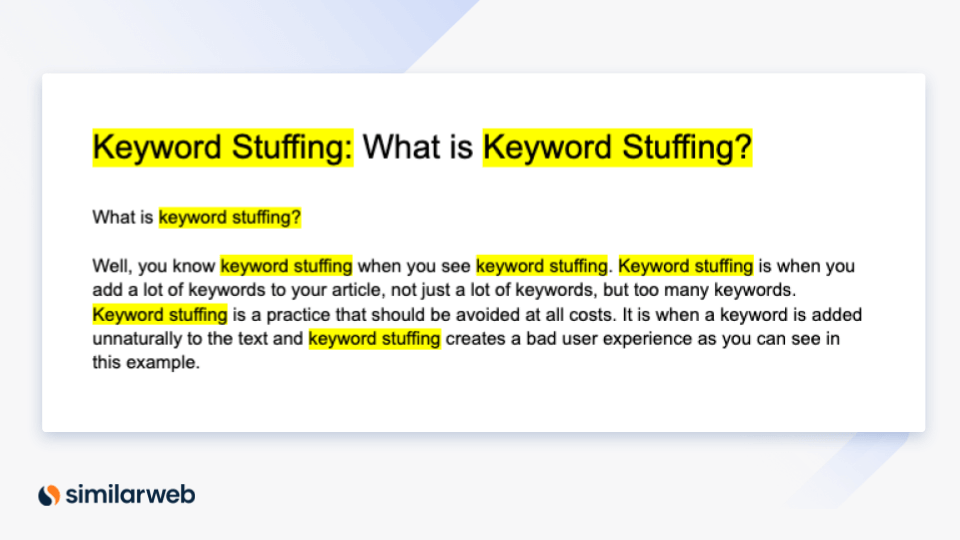
The Decline in Page Rank Due to Keyword Stuffing
According to a Search Engine Land study, websites caught keyword stuffing can see a decline in ranking by as much as 50%. Not only does this result in decreased visibility, but it also harms a brand's reputation and credibility in the eyes of its audience.
Writing for Humans First: The Mantra Every Blogger Should Adopt
Remember, while SEO is essential, your primary audience is humans, not search engines. Your content should always be engaging, valuable, and readable. Here are some do's and don'ts to help you integrate keywords naturally:
- Do use synonyms: Instead of repeating the same keyword, use its variations to make the content sound more natural.
- Don't force keywords where they don't fit: If a keyword feels out of place in a sentence, it probably is. Always prioritize sentence flow.
- Do use long-tail keywords: As we discussed earlier, they can be more specific and natural to integrate into content.
- Don't focus solely on keyword density: While it's good to have keywords present, the quality of content is paramount. A well-researched, well-written piece will always outshine a keyword-stuffed one.
While keywords are crucial tools in a blogger's arsenal, they should be used judiciously. Always prioritize delivering genuine value to your readers over trying to game search engines. After all, your audience's trust and loyalty will truly define your blog's success.
Your Path Forward
The realm of keyword research can seem vast and sometimes intimidating. But with every article you write, every keyword you identify, and every strategy you implement, you're paving the way for your content to reach its intended audience. The beauty of the digital world is that every effort counts and can lead to profound results over time.
I genuinely believe that every article, backed by sound keyword research, is not just about driving traffic. It's about making a meaningful connection, helping someone out there, and potentially making their day better with the information you share. With each post, you're a step closer to growing your online presence and making a real difference in someone's life.
When I started blogging, I was swimming in a sea of uncertainty. Navigating the complexities of SEO, figuring out my target audience, and understanding the nuances of keyword research were challenging. But with time, patience, and continuous learning, I began to see the impact. Every comment from a reader, every share, and every positive feedback became a testament to the value of persistence and ongoing learning in the world of keyword research.
So, to anyone embarking on this journey or feeling overwhelmed at times, remember this: The path of blogging and keyword research is a marathon, not a sprint. Embrace every learning opportunity, cherish every success, no matter how small, and keep moving forward. The digital landscape is vast, and there's a space for everyone willing to learn and grow.










